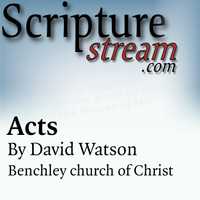-
Acts 5:29 – Christians are subject to the governing authorities (Romans 13:1-7; I Peter 2:13-15), but the apostles showed that Christians are authorized to disobey civil authority if that authority required them to disobey God.
-
Acts 5:33-42 – The teaching of the apostles threatened the status quo. This made the leaders feel threatened as they stood to lose their followers.
-
Acts 6:1-6 – Seven men were appointed to help with the work. These men did not serve in the same capacity as deacons since they were chosen for a particular time-limited work. It’s not specified exactly what was being served to the widows. It could have been food, money, or something else. Whatever it was, it was clear this was not a public outreach program – it was simply caring for the needy Christians.
-
Acts 6:7-15 – Some men from the Synagogue of the Freedmen stirred up the people against Stephen. They accused him of blasphemy, but he was doing the opposite.
-
Acts 7:1-53 – Stephen’s defense
-
Stephen recited Israelite history, include a few things not recorded in Genesis (Acts 7:2-4; cf. Genesis 11:31).
-
Stephen showed they were committing the same sins as their ancestors.
-
Guilt of jealousy:
-
OT Jews: Jealous of Joseph, Acts 7:9
-
NT Jews: Jealous of Jesus & apostles, Matthew 27:18; Acts 5:17
-
-
Rejecting God’s people and plan
-
Resisting the Holy Spirit
-
-
DW
April 21, 2019
For further study, see also:
Questions or comments? Join our Discord server for further study.
